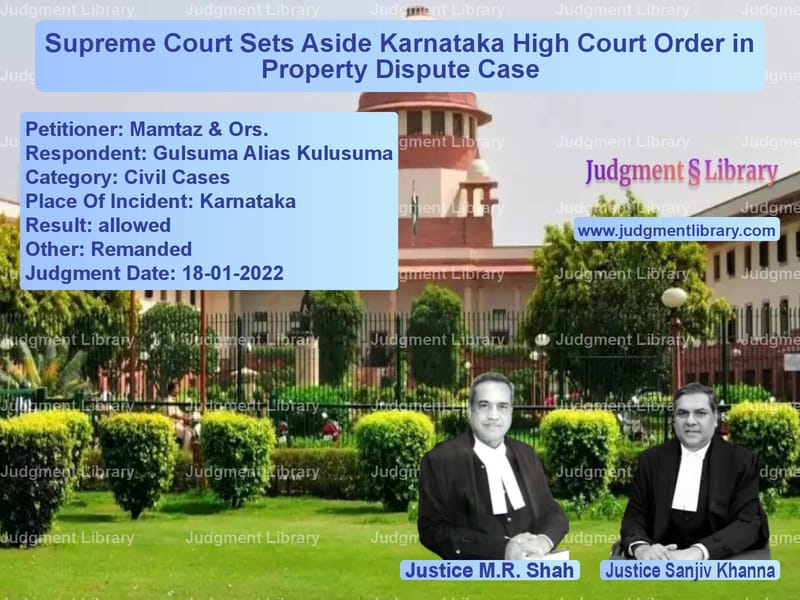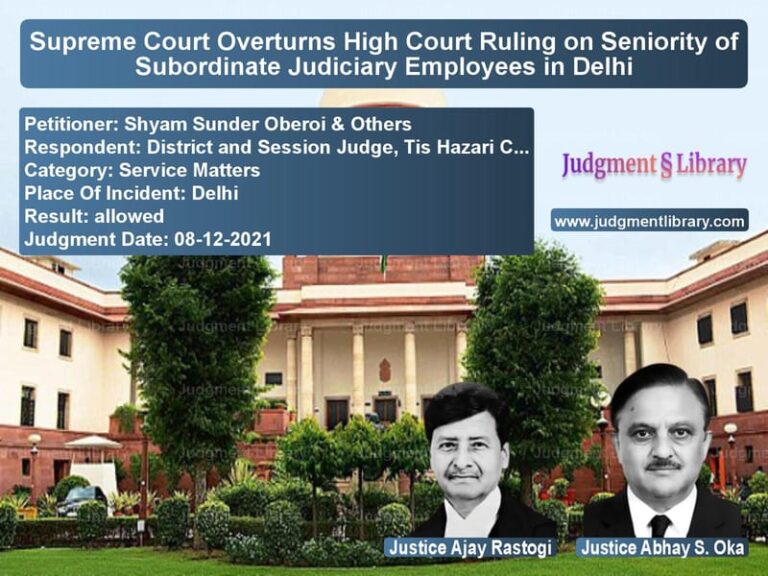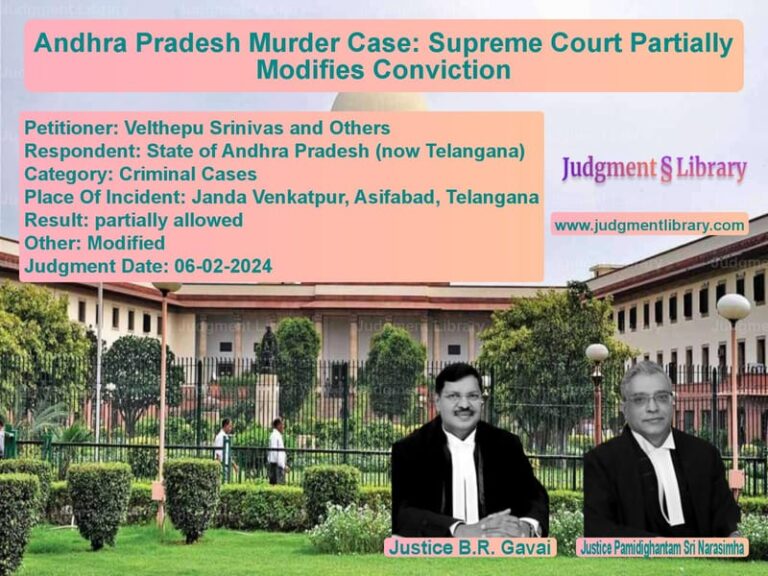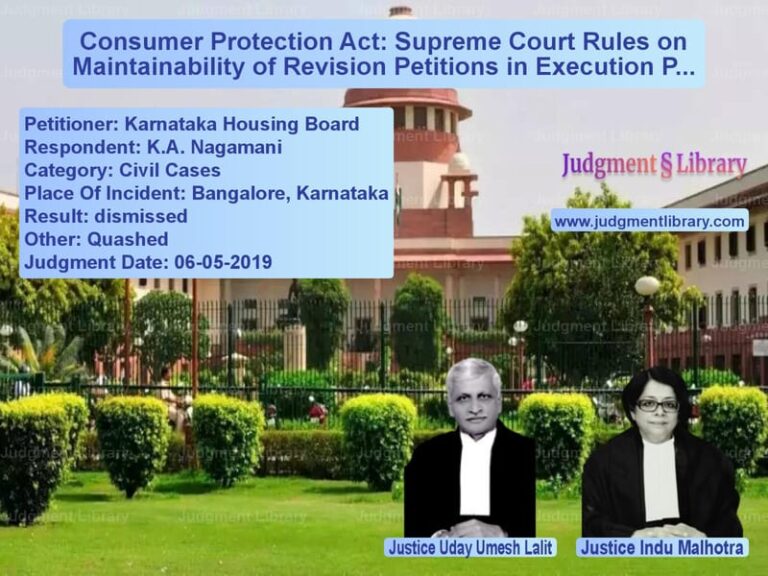Supreme Court Sets Aside Karnataka High Court Order in Property Dispute Case
The Supreme Court’s decision in Mamtaz & Ors. vs. Gulsuma Alias Kulusuma is a critical ruling in civil appellate jurisprudence concerning procedural lapses and the scope of judicial review in property disputes. The case highlights the importance of procedural discipline in appellate courts and clarifies the process of condoning delay in appeals, particularly when an ex parte decree is challenged.
Background of the Case
The dispute arose when the appellants, Mamtaz & Ors., filed a suit for declaration and possession of a property. The Trial Court decreed the suit in favor of the appellants on January 8, 2018. However, the judgment was passed ex parte as the respondent, Gulsuma, failed to appear during the proceedings.
The respondent had two legal remedies:
- Filing an application under Order IX Rule 13 of the Civil Procedure Code (CPC) to set aside the ex parte decree.
- Filing a regular appeal under Section 96 of the CPC before the First Appellate Court.
Instead of applying for setting aside the ex parte decree, the respondent chose to file an appeal before the First Appellate Court, but with a delay of 2 years and 7 months. She also filed an application to condone the delay. However, she later withdrew the delay condonation application, making the appeal inadmissible.
The First Appellate Court dismissed the appeal on December 10, 2020, citing the lack of an application for condonation of delay, rendering the appeal non-maintainable.
Feeling aggrieved, the respondent approached the Karnataka High Court, which ruled in her favor, setting aside the judgments of both the First Appellate Court and the Trial Court and remanding the matter for fresh disposal.
Legal Issues Raised
- Whether the Karnataka High Court exceeded its jurisdiction by setting aside the ex parte decree in a second appeal under Section 100 of the CPC.
- Whether the First Appellate Court correctly dismissed the appeal as non-maintainable.
- Whether the respondent could still seek condonation of delay and revival of her appeal.
Arguments of the Appellants (Mamtaz & Ors.)
The appellants challenged the Karnataka High Court’s ruling on the following grounds:
- The High Court did not have the authority to set aside the ex parte decree under Order IX Rule 13 CPC in a second appeal.
- The respondent had voluntarily withdrawn her delay condonation application before the First Appellate Court, making the appeal non-maintainable.
- The High Court erred by remanding the matter to the Trial Court instead of directing the First Appellate Court to decide the case on merits.
Arguments of the Respondent (Gulsuma)
The respondent countered the appeal by arguing:
- Her appeal before the First Appellate Court should not have been dismissed solely due to procedural lapses.
- Since the case involved property rights, a strict interpretation of procedural law should not defeat substantive justice.
- She mistakenly withdrew her delay condonation application under incorrect legal advice and should be allowed to revive it.
Supreme Court’s Observations
The Supreme Court, comprising Justices M.R. Shah and Sanjiv Khanna, made the following critical observations:
1. High Court’s Overreach in Setting Aside the Ex Parte Decree
- The High Court had no jurisdiction to set aside an ex parte decree in a second appeal under Section 100 CPC.
- The High Court’s decision was akin to considering an application under Order IX Rule 13 CPC, which was legally unsound.
- The proper course of action was to remand the case to the First Appellate Court, not the Trial Court.
2. Procedural Discipline in Appellate Jurisdiction
- The First Appellate Court was correct in dismissing the appeal as non-maintainable because the respondent failed to pursue her delay condonation application.
- If the respondent wanted relief, she should have moved an application under Order IX Rule 13 CPC or ensured that her appeal was properly maintained.
3. Revival of Delay Condonation Application
- The Supreme Court acknowledged that procedural errors should not defeat substantive rights.
- The respondent was permitted to file an application to revive her delay condonation plea before the First Appellate Court.
- If the First Appellate Court condoned the delay, the appeal would be heard on its merits.
Final Judgment
The Supreme Court ruled in favor of the appellants, setting aside the Karnataka High Court’s judgment. The key directives were:
- The matter was remanded to the First Appellate Court instead of the Trial Court.
- The respondent was allowed to move an application for revival of her delay condonation application.
- If the delay was condoned, the First Appellate Court would hear the appeal on merits.
- If the delay was not condoned, the respondent could challenge the decision before a higher forum.
The judgment stated:
“The impugned judgment of the High Court dated 21.04.2021 is hereby quashed and set aside. The matter is remanded to the First Appellate Court with liberty to the respondent to file an application for revival of I.A. No.1 of 2020. If the application is allowed, the First Appellate Court shall hear the appeal on merits.”
Implications of the Judgment
- Clarity in Appellate Jurisdiction: The ruling reinforces the limitations of High Courts in second appeals.
- Procedural Adherence: The case emphasizes the importance of following due process in appeals and condonation of delay.
- Balancing Procedural and Substantive Justice: The Supreme Court allowed the respondent a chance to revive her delay condonation plea, ensuring fairness.
Conclusion
The Supreme Court’s ruling in Mamtaz & Ors. vs. Gulsuma Alias Kulusuma is a significant precedent in civil appellate jurisprudence. It clarifies that appellate courts must function within their jurisdiction and that procedural lapses cannot be remedied arbitrarily. The decision balances procedural discipline with substantive justice by allowing the respondent an opportunity to revive her plea. The case serves as an important lesson in maintaining procedural rigor while ensuring fair adjudication of property disputes.
Petitioner Name: Mamtaz & Ors..Respondent Name: Gulsuma Alias Kulusuma.Judgment By: Justice M.R. Shah, Justice Sanjiv Khanna.Place Of Incident: Karnataka.Judgment Date: 18-01-2022.
Don’t miss out on the full details! Download the complete judgment in PDF format below and gain valuable insights instantly!
Download Judgment: mamtaz-&-ors.-vs-gulsuma-alias-kulusu-supreme-court-of-india-judgment-dated-18-01-2022.pdf
Directly Download Judgment: Directly download this Judgment
See all petitions in Property Disputes
See all petitions in Contract Disputes
See all petitions in Succession and Wills
See all petitions in Landlord-Tenant Disputes
See all petitions in Damages and Compensation
See all petitions in Judgment by Mukeshkumar Rasikbhai Shah
See all petitions in Judgment by Sanjiv Khanna
See all petitions in allowed
See all petitions in Remanded
See all petitions in supreme court of India judgments January 2022
See all petitions in 2022 judgments
See all posts in Civil Cases Category
See all allowed petitions in Civil Cases Category
See all Dismissed petitions in Civil Cases Category
See all partially allowed petitions in Civil Cases Category







